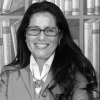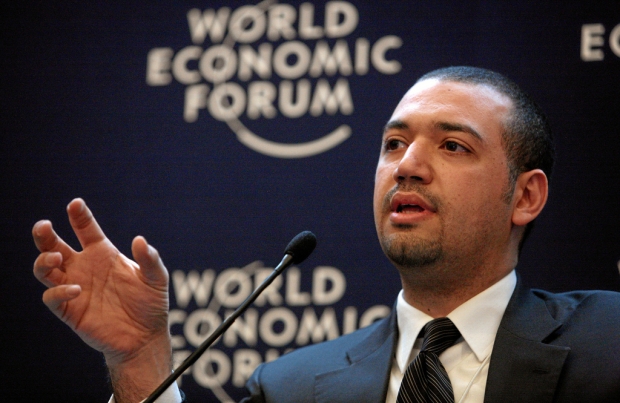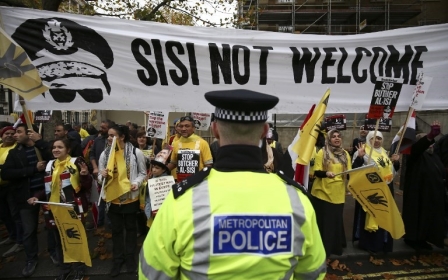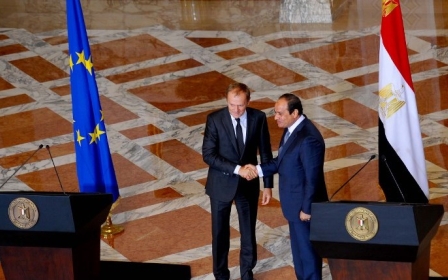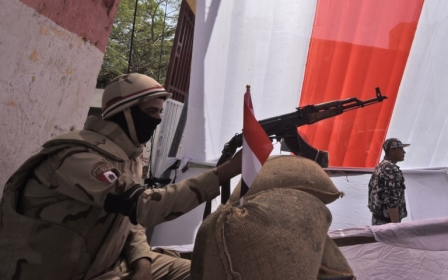Egypt's televangelists tailor their message: See no evil and life will be good

It’s hard to believe that it’s been close to 30 years since the new wave of televangelists stormed Egyptian homes, electrifying airwaves with a “novel” socioreligious discourse.
Many believed it to be transformative. Captivating the hearts and minds of Arab Muslim youth, it seemed to promise a long-awaited revival of our stagnant societies - the start of an Islamic rebirth.
The illusions seemed real; they were supported by numbers and images of mile-long, double-parked cars around the famed al-Hosary Mosque in Egypt’s 6th of October City, where accountant-turned-preacher Amr Khaled lectured on Thursday nights.
Journey to superstardom
The mosque was where Khaled’s brand of development-oriented, motivational religiosity thrived. His journey to superstardom took off, and his fanbase blossomed in Cairo’s middle-class neighbourhood of Mohandeseen in the late 90s.
By 2000, Saudi-owned TV channel Iqraa had given Khaled his own show, catapulting him to new heights of celebrity and giving birth to the Western-style televangelism that remains popular to this day.
The antithesis of Egypt’s traditional preachers, Khaled never received an orthodox religious education at al-Azhar, nor did he don the robes and headdress of typical Friday sermon sheikhs.
He was clear about his target audience: relatively affluent, educated, upwardly mobile youth who had grown apathetic towards Islam in an increasingly globalised world. His goal was to “blend Islam with the feel-good optimism of Western management literature”, as a 2006 New York Times article aptly put it.
Their focus on religion as an abstract form of ethical existence devoid of context, and the alignment of their message with that of ruling authorities ... was, in the most charitable interpretation, a symptom of the cognitive dissonance that pervaded society at large
Khaled’s rise blazed a trail for other young born-agains and so-called revivalists, such as Moez Masoud - who, as political winds changed, revealed new facets of their televangelising personas.
Before Egypt’s January 2011 uprising, the phenomenon of the un-turbaned Muslim religious icon emphasised an apolitical ‘“post-Islamist” religious discourse that Swiss scholar Patrick Haenni referred to as “air-conditioned Islam”, far removed from the realities of most Egyptians, who were struggling with poverty, social injustice and political disenfranchisement.
The extent of that schism came into focus after 2011 when, naturally, their demographic of young viewers looked to them for guidance on how to think about “politics, religion, citizenship and national belonging during what all have experienced as a most volatile time”, according to research by Egyptian cultural anthropologist Yasmine Moll.
‘Wheel of productivity’
Yet, there was little to no change in their discourse, which focused on religion as an abstract form of ethical existence devoid of context. The alignment of their message with that of the ruling authorities - specifically their emphasis on supporting the "wheel of productivity", despite the rampant abuses of power that systematically targeted the young, poor and disenfranchised - was, in the most charitable interpretation, a symptom of the cognitive dissonance that pervaded society at large.
A less charitable explanation exposed Khaled and Masoud for what they really were: an accountant and a producer.
In polarised post-2013 coup Egypt, after the military not only upended a budding democratic experiment by removing the country’s only elected president, Mohamed Morsi, but also oversaw unspeakable carnage, these televangelists were plunged into a hailstorm of controversy.
It is difficult to argue that they didn’t get exactly what they deserved, having abdicated their self-professed responsibility to guide their followers on how to achieve a perfect balance between spirituality and community engagement, between tradition and modernity. When push came to shove, their silence spoke louder than words.
The illusion that these modern televangelists signal a religious renaissance is very real. Like the chichi Zamalek koshari kitchens, their discourse is no more than a new spin on an old recipe, with a dash of saffron in the sauce and a drop of rose water in the hibiscus drink to give it that coveted aftertaste. But at the core, it’s just layers of rice, lentils and fried onions - overpriced poor-man’s food for the well-heeled.
Condemning terrorism
In 2006, the accountant was quick to condemn the violent reaction by Muslims against the offensive Danish cartoons of Prophet Muhammad, and while temporarily supporting a hardline boycott of Danish products, he soon realised that this was his chance to expand into the European market, to enter a global arena by dabbling into issues concerning Muslims in the West.
His promotion of a Western-friendly “tolerant”, “moderate” Islam, against terrorism (like the vast majority of Muslims everywhere), paid off, earning him speaking tours and a 2007 Time Magazine vote as one of the most influential people in the world.
Fast forward to 2013. Khaled the accountant, once more, does his accounting. After forming the Egypt Party and supporting Morsi in 2012, the military coup saw him flip to the other side, reportedly voting for the general-turned-civilian coup leader Abdel Fattah al-Sisi in 2014 and promoting him as the bearer of stability - not a single word condemning the killing of hundreds of unarmed innocents as an act of state terrorism.
Was this the same man who travelled the world condemning terrorism targeting the West? Yes, it was. But this incessant “rebuild Egypt” and “fix yourself first” message, which he continues to churn out on his TV shows, is a reminder of how the illusion Khaled started 30 years ago, while still relatively popular, can no longer be taken at face value.
A younger Masoud is the other face of the same coin. He, too, focused his post-2011 discourse on "the revolution of the self", dedicating an entire Ramadan series to this rarefied concept of the need to “change internally” while completely ignoring the sociopolitical context.
While emphasising the supreme goal of becoming "good citizens", parallel notions of good governance, social justice, respect for human rights and rule of law have been conspicuously absent from Masoud’s ethical equation.
For better or for worse, this is a testament to the consistency of his message: steer clear of politics and life will be good.
A shared message
Over the past few years, the producer has thrown his weight behind film and TV productions. The sequel to his TV show The Rogue Arrows, starring none other than his new wife Sherry Adel (a union for which he recently came under fire), is unsurprisingly centred on terrorist crimes committed in the name of religion - a favourite theme in post-military-coup propaganda, as the regime has shamelessly justified committing internationally condemned human rights abuses under the guise of fighting terrorism.
While the Khaleds and Masouds don’t advocate the galabeya or the face veil, they subliminally share the most dangerous message of all with their bearded brethren
Ironically, when it comes to their core message, these "new wave" preachers are aligned with their polar opposites on the televangelism spectrum: ultra-conservative Salafi preachers such as Yasser al-Borhamy and Mohamed Hassaan, who complete the circle by targeting the struggling lower classes.
Preaching submission to the leader, they too supported the 2013 military coup (albeit more publicly) against their political rivals, the Muslim Brotherhood, and were, in turn, embraced by the establishment. The 7.5 million votes that Salafis won in the first parliamentary elections after the 2011 uprising were not lost on a military regime acutely aware of the expediency of such an alliance.
While the Khaleds and Masouds don’t advocate the traditional galabeya or the face veil, they subliminally share the most dangerous message of all with their bearded brethren: keep your "revolution" to yourself, or else.
- Rania Al Malky is the former editor-in-chief of Daily News Egypt (2006-2012), which was the local publishing partner of the International Herald Tribune. She is currently a freelance contributor for various publications.
The views expressed in this article belong to the author and do not necessarily reflect the editorial policy of Middle East Eye.
Photo: Televangelist Amr Khaled gives a lecture in Toronto in December 2010 (Iraqidude/CC BY-SA 3.0/Wikimedia Commons)
New MEE newsletter: Jerusalem Dispatch
Sign up to get the latest insights and analysis on Israel-Palestine, alongside Turkey Unpacked and other MEE newsletters
Middle East Eye delivers independent and unrivalled coverage and analysis of the Middle East, North Africa and beyond. To learn more about republishing this content and the associated fees, please fill out this form. More about MEE can be found here.


